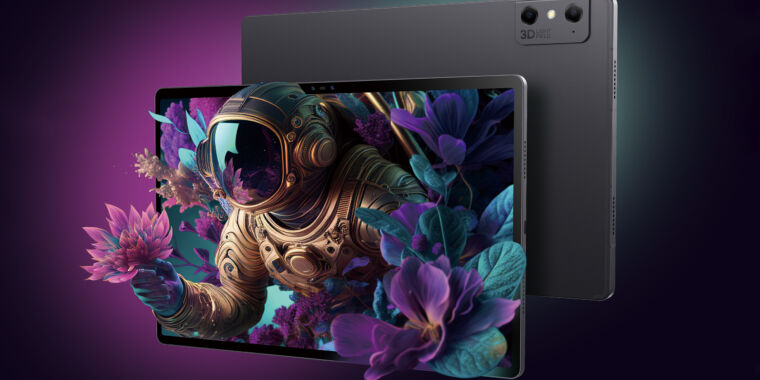The Leia Lume Pad 2 is a $1,100, glasses-free 3D Android tablet

-
The Leia (or ZTE) 3D tablet.
-
The press release is full of these cornball pop-out 3D images—which I love—but this is supposed to communicate that the camera is 3D, too.
-
The display has an extra layer between the backlight and LCD that enables the 3D effect.
-
The dual front cameras do face tracking, supposedly enabling a better viewing angle.
-
The back has dual cameras too, for stereoscopic photography.
-
Camera specs.
-
The back, along with an optional case.
-
The kickstand case, upright. Is it just me or does this look kind of thick?
-
Leia also makes a 3D PC monitor.
Does anyone out there want a 3D Android tablet? ZTE and a company called Leia—like the Star Wars princess, I guess—is making a 12.4-inch, $1,100 Android tablet with a glasses-free 3D display. Internationally the hardware is sold by ZTE and is called the “ZTE Nubia Pad 3D,” while in the US, where the government has designated ZTE a threat to national security, the tablet is branded as the “Leia Lume Pad 2.” As far as we can tell, ZTE is responsible for the hardware, while Leia is bringing 3D tech and software to the tablet.
The magic 3D display is a 12.4-inch, 120 Hz, 2560×1600 IPS LCD. It uses Leia’s light field technology for the 3D effect and face tracking via the stereoscopic front camera. This lets the display sends slightly different pictures to each eye, sort of like a Nintendo 3DS. Presumably, the effective resolution gets cut in half in 3D mode. It’s hard to tell if this is actually any good from text descriptions and flat 2D videos, but the device made the rounds at Mobile World Congress last month. A Tom’s Guide reporter called the display impressive and praised the viewing angle but also complained of headaches.
The specs sheet looks like it came from a 2-year-old flagship, starting with the Snapdragon 888 SoC from 2021. It has 8GB of RAM, 128GB or 256GB of storage, a 9070 mAh battery with 33 W fast charging, and runs Android 12L. It has a MicroSD slot, a USB-C port on the bottom, four speakers, and a pogo pin setup on the bottom edge for a charging stand. We’re working from an incomplete spec sheet here, and neither Leia nor ZTE has published dimensions or weight. The tablet looks a little thick in photos, perhaps a side effect of the extra 3D display layer.
-
Leia is running its own 3D ecosystem, but this also has Google Play.
-
The Leia 3D app store, which is oddly highlighting Super Mario Run?
-
The movie store with WB and Disney movies.
Where, exactly, you are supposed to find 3D content to play on the device is a bit of a problem. First, you can make it yourself. The front and rear cameras both take stereoscopic 3D images. That means two sets of camera sensors on the front (8MP) and back (16MP). Leia promises “realtime 2D to 3D conversion” of videos, which sounds like a disaster. There is an option for 3D video chat “Powered by Zoom,” presumably that means both people would need Leia tablets. Of course, it would not be 2023 without an onboard generative image AI that will make 3D art for you to look at (it uses Stable Diffusion).
Leia has a whole ecosystem of 3D apps through its “Leia Appstore,” which also has some 3D games in it (it’s not browsable online, sadly). The company has decent-looking developer documentation and plugins for Unity, Unreal, the Android SDK, Maya, Blender, and WebGL. There’s a “Leia Flix” app with some 3D Hollywood movies from what looks like Disney and Warner Bros. There’s also a “Leia Viewer” app that lets you build 3D models.
The ZTE version is up for preorder starting today internationally for 1,299 euro/1,149 pounds, while the US Leia version is $1,099 and can only be “reserved” for free. Both tablets ship in April.
Listing image by ZTE
https://arstechnica.com/?p=1926282